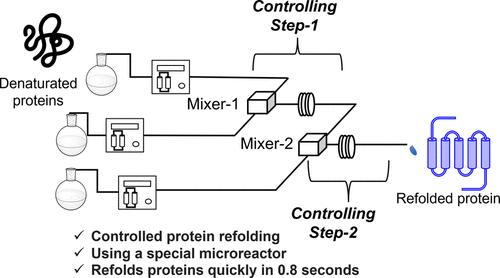Our official English website, www.x-mol.net, welcomes your feedback! (Note: you will need to create a separate account there.)
Spatiotemporal Control of Protein Refolding through Flash-Change Reaction Conditions
Langmuir ( IF 3.9 ) Pub Date : 2024-04-15 , DOI: 10.1021/acs.langmuir.4c00024 Yuichi Nakahara 1, 2 , Tomoko Kawaguchi 2 , Yutaka Matsuda 3 , Yuta Endo 1 , Masayo Date 1 , Kazutoshi Takahashi 1 , Keisuke Kato 1 , Takahiro Okasora 1 , Daisuke Ejima 1 , Aiichiro Nagaki 2
Langmuir ( IF 3.9 ) Pub Date : 2024-04-15 , DOI: 10.1021/acs.langmuir.4c00024 Yuichi Nakahara 1, 2 , Tomoko Kawaguchi 2 , Yutaka Matsuda 3 , Yuta Endo 1 , Masayo Date 1 , Kazutoshi Takahashi 1 , Keisuke Kato 1 , Takahiro Okasora 1 , Daisuke Ejima 1 , Aiichiro Nagaki 2
Affiliation

|
Recombinant protein production is an essential aspect of biopharmaceutical manufacturing, with Escherichia coli serving as a primary host organism. Protein refolding is vital for protein production; however, conventional refolding methods face challenges such as scale-up limitations and difficulties in controlling protein conformational changes on a millisecond scale. In this study, we demonstrate the novel application of flow microreactors (FMR) in controlling protein conformational changes on a millisecond scale, enabling efficient refolding processes and opening up new avenues in the science of FMR technology. FMR technology has been primarily employed for small-molecule synthesis, but our novel approach successfully expands its application to protein refolding, offering precise control of the buffer pH and solvent content. Using interleukin-6 as a model, the system yielded an impressive 96% pure refolded protein and allowed for gram-scale production. This FMR system allows flash changes in the reaction conditions, effectively circumventing protein aggregation during refolding. To the best of our knowledge, this is the first study to use FMR for protein refolding, which offers a more efficient and scalable method for protein production. The study results highlight the utility of the FMR as a high-throughput screening tool for streamlined scale-up and emphasize the importance of understanding and controlling intermediates in the refolding process. The FMR technique offers a promising approach for enhancing protein refolding efficiency and has demonstrated its potential in streamlining the process from laboratory-scale research to industrial-scale production, making it a game-changing technology in the field.
中文翻译:

通过闪变反应条件对蛋白质重折叠进行时空控制
重组蛋白生产是生物制药生产的一个重要方面,其中大肠杆菌是主要宿主生物。蛋白质重折叠对于蛋白质生产至关重要;然而,传统的重折叠方法面临着放大限制和难以在毫秒尺度上控制蛋白质构象变化等挑战。在这项研究中,我们展示了流动微反应器(FMR)在毫秒级控制蛋白质构象变化方面的新应用,实现了高效的重折叠过程,并开辟了 FMR 技术科学的新途径。 FMR 技术主要用于小分子合成,但我们的新方法成功地将其应用扩展到蛋白质重折叠,提供对缓冲液 pH 值和溶剂含量的精确控制。该系统以 interleukin-6 作为模型,产生了令人印象深刻的 96% 纯度的重折叠蛋白,并可进行克级生产。该 FMR 系统允许快速改变反应条件,有效避免重折叠过程中的蛋白质聚集。据我们所知,这是第一项使用 FMR 进行蛋白质重折叠的研究,它为蛋白质生产提供了一种更有效和可扩展的方法。研究结果强调了 FMR 作为简化放大的高通量筛选工具的实用性,并强调了理解和控制重折叠过程中中间体的重要性。 FMR 技术为提高蛋白质重折叠效率提供了一种有前途的方法,并已证明其在简化从实验室规模研究到工业规模生产的过程方面的潜力,使其成为该领域的一项改变游戏规则的技术。
更新日期:2024-04-15
中文翻译:

通过闪变反应条件对蛋白质重折叠进行时空控制
重组蛋白生产是生物制药生产的一个重要方面,其中大肠杆菌是主要宿主生物。蛋白质重折叠对于蛋白质生产至关重要;然而,传统的重折叠方法面临着放大限制和难以在毫秒尺度上控制蛋白质构象变化等挑战。在这项研究中,我们展示了流动微反应器(FMR)在毫秒级控制蛋白质构象变化方面的新应用,实现了高效的重折叠过程,并开辟了 FMR 技术科学的新途径。 FMR 技术主要用于小分子合成,但我们的新方法成功地将其应用扩展到蛋白质重折叠,提供对缓冲液 pH 值和溶剂含量的精确控制。该系统以 interleukin-6 作为模型,产生了令人印象深刻的 96% 纯度的重折叠蛋白,并可进行克级生产。该 FMR 系统允许快速改变反应条件,有效避免重折叠过程中的蛋白质聚集。据我们所知,这是第一项使用 FMR 进行蛋白质重折叠的研究,它为蛋白质生产提供了一种更有效和可扩展的方法。研究结果强调了 FMR 作为简化放大的高通量筛选工具的实用性,并强调了理解和控制重折叠过程中中间体的重要性。 FMR 技术为提高蛋白质重折叠效率提供了一种有前途的方法,并已证明其在简化从实验室规模研究到工业规模生产的过程方面的潜力,使其成为该领域的一项改变游戏规则的技术。



























 京公网安备 11010802027423号
京公网安备 11010802027423号